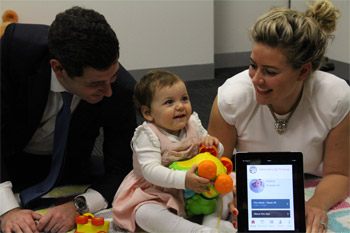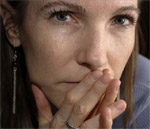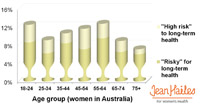Professor Jane Fisher What Were We Thinking Blog Interview

Professor Jane Fisher What Were We Thinking Blog Interview
In an Australian first, new online tools designed to reduce postnatal mental disorders in both mothers and fathers, based on the findings of a 10-year research study, have been launched by leading women's health organisation, Jean Hailes for Women's Health.
Almost one-third of people living in rural or remote areas report psychological distress. Up to 1 in 4 women in Australia will experience disabling symptoms of depression or anxiety in the first year after giving birth. Additionally, around 1 in 10 fathers will experience clinically significant psychological distress in the first 5 years of fatherhood.
'Additional factors that could contribute to postnatal depression and anxiety in new parents in regional and rural Australia include: lack of access to mental health services, social isolation and stigma about mental health treatment," Professor Jane Fisher, Director of the Jean Hailes Research Unit at Monash University, says.
'The birth of a first baby is one of the biggest life transitions we can experience. Major life changes are always accompanied by mixed feelings and most of us feel under-equipped to manage the responsibilities of caring for a newborn baby," Professor Fisher says.
'We have identified two major risk factors that can lead to postnatal depression or anxiety: caring for an unsettled baby and a partner who is unwilling to share the work or who is critical or controlling.
'The What Were We Thinking blog and app developed by Jean Hailes for Women's Health are designed to prevent postnatal depression and anxiety and promote confidence in parents by providing strategies to help settle the baby, and to negotiate the changes in their relationship without confrontation," Professor Fisher says.
The program is informed by 10 years of research in residential early parenting services and the community, by Professor Jane Fisher and Dr Heather Rowe. This research has identified risks to parents' mental health and shown that by addressing them with opportunities to acquire essential knowledge and skills, the common postnatal mental disorders in first time parents can be prevented.
Uniquely, the tools are for fathers and mothers: the blog encourages both parents to share their experiences and the app is focused on building skills and confidence for both parents.
'Babies benefit from care from both parents. Fathers play an incredibly important role in parenting, but we have shown that, in general, they are not included in the first time parents' groups that provide vital parenting education. What Were We Thinking provides new language and ideas to help both parents adjust to the changes in their relationship with each other after the birth of their first baby," Professor Fisher says.
Health Minister Sussan Ley said the Australian Government has committed more than $1.1 million dollars for the development of the blog and app.
'The Australian Government is committed to ensuring that mental health services are appropriately targeted at patients' needs and this project will offer Australian parents improved access to help and support," Ms Ley says.
The launch comes after a 12-month pilot of the blog, completed as part of the research. The blog follows the experiences of a team of new mums and dads. Maternal and child health nurses, psychologists and other health professionals respond to their posts with expert advice and all new parents from around Australia are invited to share their experiences by leaving comments on the blog posts or on the blog's social wall.
The app provides parents with information about each stage of their baby's development through quizzes, activities and videos and the key things for new parents to watch out for in respect to their own wellbeing.
New mum and pilot participant, Morgan Lacey, found the information and support she received helped her through a difficult time. I felt like I'd lost my identity and was all of a sudden not so good at a whole lot of things. The blog was something that came into my life and became my little outlet. I found it a great opportunity to feel connected, when otherwise I was a little bit lost," Morgan says.
Mothers of babies who cry excessively report significantly more parenting stress and less sense of competence than other mothers. Other common reasons for new parents to seek help include frequent nighttime waking, short daytime sleeps and feeding difficulties.
Jean Hailes for Women's Health is Australia's leading and most trusted women's health organisation. It is a national, not for profit organisation dedicated to improving the knowledge of women's health throughout the various stages of their lives.
Download the free app.
Perspectives Of New Parents: Alexandra Harvey And Alberto Simongini
Alexandra and her husband Alberto are the very proud parents of baby Victoria, who was born in early 2014. Alberto is originally from Italy but now lives permanently in Australia with his growing family.
Alexandra has documented her journey into parenthood on the blog and readers have really connected with her dry sense of humour and honest accounts of some of the struggles that come with being a new mum.
'When you're in the hospital and you're wandering around all dazed and confused at four in the morning and you're trying work out how to feed this baby, it's a bit like camping. All the things that you would do at the dinner table or at a restaurant fall to the wayside when you're camping and it's just survival.
'So you get this confidence from the other bloggers because you know [when you read their posts] that on that particular day it was about survival."
Alberto has brought the perspective of a father to the blog and shares his experiences about juggling work and family, and sharing the load with his partner, Alexandra.
'No one can prepare you for becoming a father. I fell completely in love with Victoria as soon as she was born but to say that I felt overwhelmed would be a major understatement. As I took this beautiful tiny new human-being to be weighed, I knew that my life had completely changed."
Interview with Professor Jane Fisher
Jane Fisher, an academic Clinical and Health Psychologist is the Jean Hailes Professor of Women's Health at Monash University, and Director of the Jean Hailes Research Unit which is in the School of Public Health and Preventive Medicine at Monash University. She has long-standing interests in the links between women's reproductive health and mental health - in particular related to fertility, conception, pregnancy, birth and the postpartum period.
Question: What is What Were We Thinking?
Professor Jane Fisher: All parents with a newborn have to learn how to care for their baby and to adjust to the inevitable changes this life stage brings. What Were We Thinking is an innovative education program for parents with a first baby. It addresses two experiences that most people find challenging. First, the impact of unsettled infant behaviours like prolonged crying, difficulties settling to sleep and waking after short sleeps; and second, how to negotiate which of them will take responsibility for which tasks now that they have a baby. What Were We Thinking (WWWT) teaches new parents the skills that are essential to becoming a confident parent: how to recognise and understand the baby's cues and what to do to soothe and settle them, and how to understand each other's changed needs and to work things out fairly and without arguing.
The WWWT program began in a face-to-face seminar format offered to parents at their local maternal and child health center. However, this was not accessible to everyone. Today it has been launched as both an app and a blog. The app teaches parents useful skills through interactive quizzes, videos and activities. It is for both fathers and mothers, with lots of opportunities to compare notes and ideas about what to do if difficulties arise. The blog invites new parents to share their experiences with each other, and to have access to health professionals who are experts in the field and can provide guidance and suggestions about common problems. Together the app and the blog are designed to meet the needs of parents in the first six months of their baby's life.
Question: Can you talk us through the blog and app's features?
Professor Jane Fisher: Rather than being presented in a one-day seminar, the app provides week-by-week opportunities to practice and learn. It includes quizzes, activities, videos and helpful information about common problems and what to do about them.
The blog is a wonderful learning exchange between parents and expert health professionals. It is full of the real, lived experiences of new parents in Australia. The blog also features a -social wall' where all parents can come to share their experiences of becoming a parent.
The app and the blog are backed by more than ten years of research.
Question: What was the main inspiration for the development of What Were We Thinking?
Professor Jane Fisher: For nearly twenty years I have been the Clinical Psychologist at Masada Private Hospital Mother Baby Unit, which is a residential early parenting service in Melbourne. In that work I have met more than 10,000 women who are completing the five-night program with their babies. I have learnt through my countless conversations with them about how common it is for babies to cry for prolonged periods, wake after short sleeps and to be difficult to feed. Not only are the babies then underslept and irritable, but their mothers have had insufficient and frequently interrupted sleep for months. Often relationships with their intimate partners have become strained, with irritable critical exchanges and a sense that their needs are not well understood or recognised.
We have since conducted research at this service and other early parenting services in Melbourne. Very generous groups of women have completed detailed questionnaires about their health and circumstances, first during the admission and then in the short and longer term after they go home. We have learnt that almost all are severely fatigued and many have significant symptoms of anxiety and low mood.
Together these clinical experiences and our research led us to develop a program that might prevent these problems before they developed, by offering parents the knowledge and skills they need soon after their babies are born.
Question: How will this online tool help prevent post-natal depression and anxiety in Aussie mums and dads?
Professor Jane Fisher: We tested the What Were We Thinking program in a research trial involving about 400 couples with a first baby living in seven local government areas in Victoria. We compared experiences of low mood and persistent worry between the group who received usual maternal and child health care and the group who received usual care and also participated in a one-day What Were We Thinking seminar. These seminars were facilitated by specialist maternal and child health nurses and participants were given take-home materials for ongoing reference. Rates of depression and anxiety six months later were about half among the group who completed the WWWT program compared to the group who did not have it.
In the face-to-face format the program is only accessible to some people. The app and the blog aim to make this evidence-informed program available to people wherever they live in Australia. These tools aim to give new parents the knowledge and skills they need, at precisely the time they need them, and to interact with other parents who are learning the same skills. WWWT has two components. The first centres on the baby, including activities like: learning to recognise tired cues, how to soothe and settle the baby and establish sustainable feed, play, sleep routines of daily care. The second focuses on the parents: understanding that unpaid household work increases dramatically, that many losses as well as gains follow the birth of a baby and that criticism and angry arguments are especially harmful when you are learning to do something new and difficult. It helps parents recognise these changed needs and to solve problems together effectively. Together these protect new parents' emotional wellbeing.
Question: What are the main causes of post-natal depression?
Professor Jane Fisher: -Postnatal depression' is a general rather than a technical term, which covers several mental health problems among women who have recently given birth. Generalised anxiety is more common than depression and many people have what are termed -adjustment disorders' with either anxiety or a depressed mood. Most are of mild to moderate severity. These psychological states are caused by multiple factors and not just a single factor. The most commonly recognised ones are having a past personal history of mental health problems, including depression or an eating or substance abuse disorder; having experienced childhood maltreatment; having other difficult life circumstances like unemployment or illness in a family member at the same time as having a baby; being socially isolated and having insufficient practical and emotional support and not being able to confide in an intimate partner. Reproductive health difficulties like an unintended or unwanted pregnancy or past infertility or a miscarriage or stillbirth or frightening and disappointing childbirth experiences are also relevant. The impact of having an unsettled baby and of severe fatigue have only been recognised more recently.
Question: What are the symptoms for post-natal depression?
Professor Jane Fisher: As -postnatal depression' is not a single condition, quite diverse symptoms are relevant. We now talk about depression and anxiety, as they are not readily distinguishable from each other. The symptoms include feeling sad, pessimistic about the future, worried and agitated, unable to enjoy things, irritable and defeated. All of us have these experiences some of the time, but when this is what is experienced most of the time, on most days, for at least two weeks, it is important to consider getting some assistance.
Question: How is post-natal depression treated?
Professor Jane Fisher: Treatment requires first a comprehensive assessment with a health professional and then an individual care plan. We know that residential early parenting programs which teach mothers the skills of managing unsettled babies, while learning about how to manage the work of infant care and increased household tasks are associated with rapid and sustained improvements in mood. These highly structured four-or five-night programs are available in all Australian states and territories apart from the Northern Territory. Some women find antidepressant medication helpful, although others prefer to use different treatments if they are breastfeeding. Psychological treatments including cognitive behavioural therapy with a clinical psychologist, psychiatrist or other mental health professional is generally helpful. Some find counselling as a couple useful. It is always important to consult your GP who will work out a care plan with you.
Question: How common is post-natal depression in fathers?
Professor Jane Fisher: It is not necessarily accurate to use the term -postnatal' to describe mental health problems among men who have recently become fathers, especially as research suggests that one in ten fathers in Australia will experience clinically significant psychological distress, but in the first five years of fatherhood. Major Depression is quite rare, and the most common problem among men is mild to moderate anxiety. It is often focused on worries about providing financially for the family. Some men use alcohol dangerously after they have a baby, perhaps as a way of managing anxiety. This is problematic if it contributes to poor anger management.
Question: What does this online tool mean for new parents?
Professor Jane Fisher: These new online tools will allow parents across Australia to access the latest evidence-based guidance for preventing problems before they are established and growing in confidence. The app is a resource for rapid problem solving at home at any time of day or day of the week. The blog reduces loneliness by assisting parents to connect with other new mums and dads through reading about their experiences and having access to expert advice from experienced health professionals.
Question: How has the program already helped new mothers?
Professor Jane Fisher: We have robust research evidence that the WWWT program is helpful to parents' emotional wellbeing, relationship with each other and confidence in caregiving. The pilot phase of the blog has found that it helped many new mothers to build their confidence and skills as a parent and reduced loneliness and uncertainty. We will be evaluating the app as it is used. In preliminary testing during its development, men and women told us that they liked the content, how it was organised and that it could be searched in more than one way.
Interview by Brooke Hunter
Have You Seen This?
MORE












